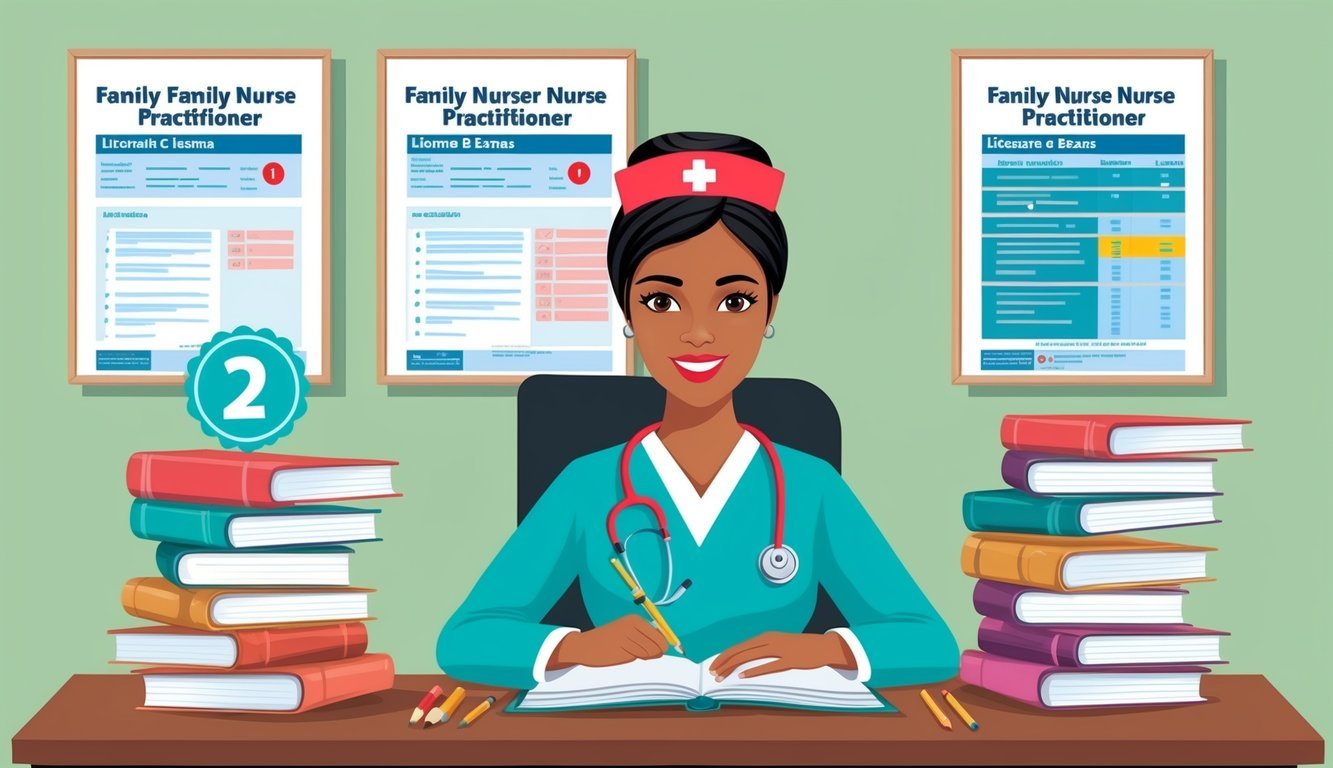Becoming a Family Nurse Practitioner (FNP) is an excellent career choice for Registered Nurses (RNs) seeking to advance their practice and provide comprehensive primary care.
To become an FNP, you need to pursue advanced education, obtain certification, and gain the necessary clinical experience.
As an Advanced Practice Registered Nurse (APRN), you’ll have the ability to diagnose illnesses, develop treatment plans, and prescribe medications, making a significant impact on patient health outcomes.
The pathway to becoming an FNP typically involves completing a Master of Science in Nursing (M.S.N.) or a Doctor of Nursing Practice (D.N.P.), which can take two to seven years to complete, depending on prior education and the format of the program.
These rigorous programs emphasize not only clinical skills but also leadership and healthcare policy, equipping you to handle the complexities of patient care in today’s healthcare environment.
For further guidance, you can explore resources like Nurse.org’s guide.
In your role as a Family Nurse Practitioner, you’ll focus on preventative care, chronic disease management, and health education, thus promoting overall wellness in the communities you serve.
To succeed, you will also need to stay informed about evolving healthcare practices and continuously enhance your skills.
For more detailed steps on this career path, refer to Forbes’ step-by-step guide.
Path to Becoming a Family Nurse Practitioner
To become a Family Nurse Practitioner (FNP), you will need to follow a structured pathway that typically includes educational requirements, nursing experience, and graduate-level education.
Each step is vital for building the necessary skills and knowledge in providing comprehensive healthcare.
Educational Requirements
Begin your journey by obtaining a Bachelor of Science in Nursing (BSN).
This degree provides foundational nursing knowledge and skills, including courses on anatomy, pharmacology, and patient care.
Many programs also emphasize clinical practice, which is essential for gaining hands-on experience.
After completing your BSN, you will need to pass the NCLEX-RN to become a licensed registered nurse (RN).
This licensure is crucial for progressing in your nursing career.
Following this, consider advanced degrees.
Pursuing a Master of Science in Nursing (MSN) is typically the next step, which focuses on specialized training necessary for FNP roles.
Nursing Experience
Acquiring nursing experience is vital before entering FNP programs.
Most institutions require you to have at least one to two years of clinical experience as an RN.
This time allows you to work in various healthcare settings, enhancing your patient assessment and critical thinking skills.
You may want to gain experience in different specialties such as pediatrics, adult care, or geriatrics.
This diversity will prepare you for the varied scenarios you will encounter as an FNP.
Participating in professional organizations and networking with established nurse practitioners can also be beneficial during this phase.
Graduate-Level Education and Specializations
Graduate-level education is essential for becoming an FNP.
After earning your MSN, you can pursue a Doctor of Nursing Practice (DNP) for advanced clinical practice and leadership skills.
Some programs may offer concentrations that allow you to specialize further, such as pediatrics or women’s health.
Make sure to choose accredited programs that prepare you for national certification as an FNP.
Certification often involves passing an exam from a recognized board, such as the American Academy of Nurse Practitioners.
This certification is crucial for practicing independently and expanding your career options.
Consider exploring programs that offer online components, making it more flexible to balance your education with work.
Resources like Nurse.org can provide additional insights into navigating your journey to becoming an FNP.
Licensure and Certification

To practice as a Family Nurse Practitioner (FNP), you must complete specific licensure and certification requirements.
These steps ensure you are qualified to provide care in various healthcare settings.
National Council Licensure Examination for RNs
Before you can become an FNP, obtaining your Registered Nurse (RN) license is essential.
This involves passing the National Council Licensure Examination for Registered Nurses (NCLEX-RN).
Key Points:
- Eligibility: You must have graduated from an accredited nursing program.
- Application: Apply through your state’s nursing board to take the NCLEX-RN.
- Exam Details: The exam assesses your nursing knowledge and skills through various questions, requiring a strong understanding of nursing fundamentals.
Passing the NCLEX-RN is a crucial step toward achieving your RN licensure, and it paves the way for your advanced practice roles.
Certification for Family Nurse Practitioners
Once you have your RN license, the next step is obtaining certification as a Family Nurse Practitioner.
This typically involves passing a certification exam, such as those offered by organizations like the American Nurses Credentialing Center (ANCC) or the American Association of Nurse Practitioners (AANP).
Certification Options:
| Organization | Certification Type |
|---|---|
| ANCC | Family Nurse Practitioner (FNP-BC) |
| AANP | Family Nurse Practitioner (FNP) |
To earn certification, you typically need:
- At least a Master’s degree in Nursing or a Doctor of Nursing Practice (DNP).
- Completion of a program accredited by the Commission on Collegiate Nursing Education (CCNE) or the Accreditation Commission for Education in Nursing (ACEN).
State Licensure Requirements
State licensure regulations for FNPs can vary significantly.
After obtaining your certification, you must apply for licensure in your specific state.
Considerations:
- Application Process: Usually involves submitting proof of your education and certification.
- Continuing Education: Most states require ongoing education for license renewal.
- Scope of Practice: Each state defines the scope of practice for FNPs; check your state’s laws.
Ensure you stay informed about the requirements of your state’s nursing board to maintain your licensure and certification effectively.
Clinical Competence and Specialties
Clinical competence is crucial for family nurse practitioners (FNPs) as it directly impacts patient care.
Mastery in various specialties allows you to provide comprehensive healthcare across different demographics and clinical settings.
The following subsections explore key areas of expertise vital for your role.
Clinical Training and Hours
To become proficient, you must engage in extensive clinical training.
This typically involves a minimum of 500 supervised clinical hours as part of your graduate education.
These hours encompass various settings where you gain hands-on experience in assessment, diagnosis, and treatment.
Your clinical training should include exposure to diverse patient populations and complex cases.
This experience enhances your clinical knowledge in fields such as pathophysiology and pharmacology.
You will work closely with experienced professionals, refining your skills and confidence, which are essential for effective patient interactions.
Pediatrics and Women’s Health
When specializing in pediatrics and women’s health, you address unique healthcare needs.
Pediatric Nurse Practitioners (PNPs) focus on developmental stages from infancy to adolescence, emphasizing preventive care and chronic condition management.
In women’s health, you may address reproductive health, prenatal care, and menopause.
Collaborative practices with obstetricians and gynecologists ensure comprehensive care.
Your role requires knowledge of specific health issues such as childhood obesity, menstrual disorders, and hormonal changes, allowing you to tailor your approach to individual patients.
Gerontology and Adult Care
As the population ages, expertise in gerontology becomes increasingly significant.
You provide care to older adults with a focus on chronic conditions, functional limitations, and mental health.
Understanding the complexities of aging, including oncology and other prevalent health issues, is essential.
Your approach will frequently involve managing multiple chronic conditions and coordinating with various healthcare providers.
Educational programs often emphasize effective communication strategies to engage effectively with older adults and their families, ensuring optimal outcomes for this vulnerable population.
Acute and Chronic Condition Management
Managing acute and chronic conditions requires a strong foundation in clinical knowledge and practical skills.
You will often assess patients experiencing sudden health issues, necessitating rapid decision-making and intervention.
Chronic conditions, on the other hand, require long-term management strategies and patient education.
You will develop individualized care plans, focusing on treatment adherence and lifestyle modifications.
Your proficiency in pharmacology will enable you to prescribe appropriate medications while monitoring for side effects and interactions.
This holistic approach is crucial in both acute and chronic care settings, ensuring comprehensive management of the patient’s health.
Professional Skills and Responsibilities
As a family nurse practitioner (FNP), you will utilize a range of skills and responsibilities essential for providing comprehensive patient care.
Your role involves effective communication, accurate diagnosis, and a commitment to health promotion and disease prevention.
Patient Education and Communication
Effective patient education is key to successful healthcare delivery.
You will be responsible for communicating treatment plans clearly to ensure that patients understand their care options.
This includes discussing medications, potential side effects, and the importance of adherence to prescribed treatments.
Utilizing strong communication skills allows you to bridge the gap between complex medical information and patient understanding.
Encouraging questions helps create an open dialogue, making patients feel valued and engaged in their healthcare journey.
Visual aids, written materials, and teach-back methods can enhance this educational process. Learn more about communication skills here.
Diagnostic Tests and Prescribing Medication
In your role, performing health assessments is critical for accurate diagnosis.
This includes taking medical histories, conducting physical exams, and ordering diagnostic tests when necessary.
Understanding test results is essential for developing effective treatment plans tailored to each patient.
You will also have the authority to prescribe medication, which requires a thorough understanding of pharmacology and the ability to balance benefits with potential risks.
Continuous evaluation of a patient’s response to treatment is vital, allowing you to make timely adjustments as needed.
This ensures optimal patient outcomes while minimizing adverse effects.
Health Promotion and Disease Prevention
Focusing on health promotion and disease prevention involves proactive strategies to enhance patient well-being.
You will educate patients about lifestyle choices, such as nutrition and exercise, that can help reduce the risk of chronic diseases.
Implementing preventive measures, such as immunizations and screenings, is also part of your responsibility.
Critical thinking is essential in assessing individual patient needs and developing customized prevention plans.
Your efforts in this area can lead to improved health outcomes and a decrease in healthcare costs.
Career Outlook and Advancement
The career outlook for Family Nurse Practitioners (FNPs) is promising, driven by increasing healthcare demands and a growing job market.
Understanding the job market, salary expectations, and opportunities for continuing education is essential for your professional advancement.
Job Market and Employment Growth
The job market for FNPs is expanding rapidly.
The Bureau of Labor Statistics (BLS) projects that nurse practitioner employment will grow 38% from 2021 to 2031.
This growth is much faster than the average for other occupations.
An aging population and a shift towards preventive care are fueling this increase.
They allow FNPs to play a critical role in primary healthcare settings.
FNPs can find employment in various environments, including:
- Primary care clinics
- Private practices
- Community health centers
As healthcare systems increasingly adopt team-based approaches, FNPs are becoming integral to interdisciplinary teams.
This enhances their job security and career opportunities.
Salary Expectations and Factors Affecting Pay
As an FNP, your earning potential is substantial.
The average annual salary for Family Nurse Practitioners is approximately $125,900.
Factors that influence your pay include:
- Geographic location
- Level of experience
- Type of healthcare facility
For instance, FNPs working in metropolitan areas typically earn more than those in rural settings.
Specialization can also impact salary; FNPs focusing on specific populations or procedures may command higher pay.
Here’s a table to illustrate average salaries based on settings:
| Setting | Average Salary |
|---|---|
| Primary Care Clinics | $120,000 |
| Hospitals | $130,000 |
| Urgent Care Centers | $128,000 |
| Community Health Centers | $115,000 |
Continuing Education and Professional Development
FNPs need to maintain certification and enhance their skills.
Engaging in professional development not only keeps you updated with industry standards but can also lead to career advancements.
You may consider pursuing additional certifications or specialized training in areas such as pediatrics, geriatrics, and emergency care.
Many organizations offer continuing education opportunities, including conferences, workshops, and online courses.
Staying current with certifications and participating in professional organizations can open doors to leadership roles and specialized positions, further enhancing your career trajectory.

